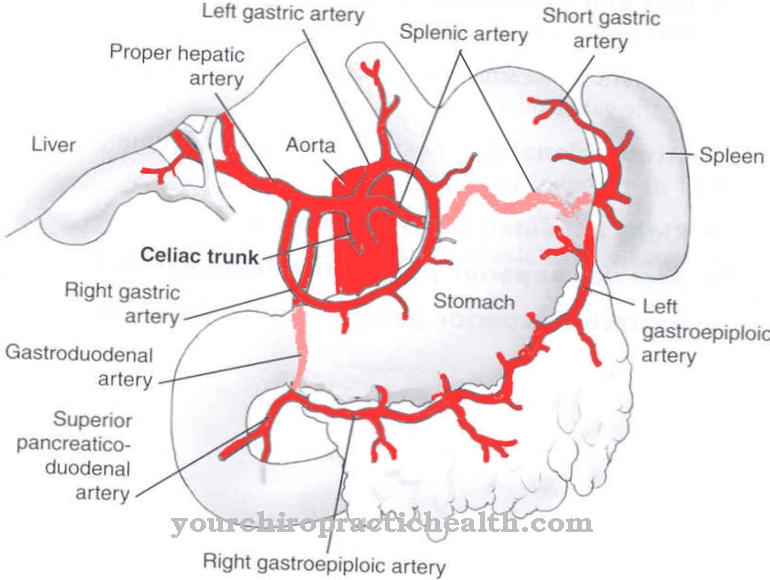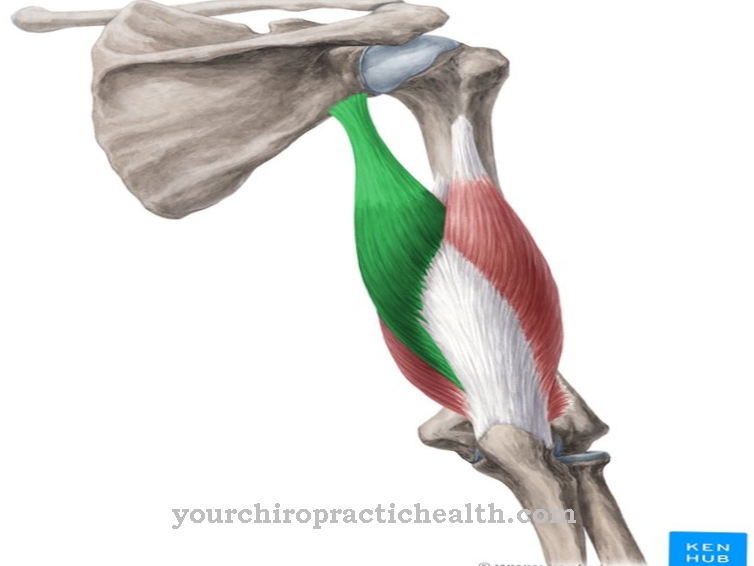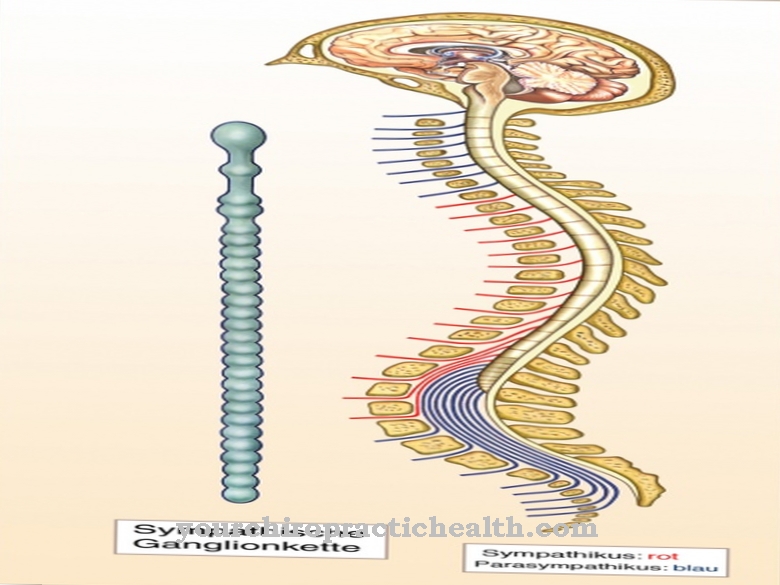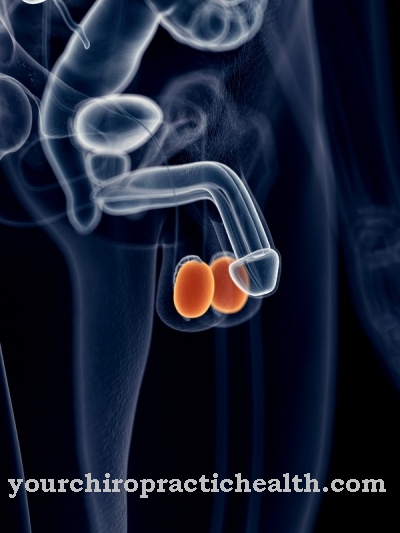The Pickwick Syndrome is a condition that occurs in people who are extremely overweight. It is a form of obstructive sleep apnea.
What is Pickwick Syndrome?

© StockPhotoPro - stock.adobe.com
The Pickwick Syndrome owes its name to a character from the novel "The Pickwickier" by Charles Dickens. The coachman Little Fat Joe sleeps most of the time in this book. The patients with Pickwick syndrome also suffer from extreme fatigue every day. Pickwick syndrome is also called Obesity hypoventilation syndrome or as Obesity-related hypoventilation syndrome designated.
It occurs only in people with severe obesity, i.e. extremely overweight. If the body mass index is over 30, the World Health Organization (WHO) speaks of obesity. However, patients with Pickwick syndrome often have a BMI of over 40 or 50. As a result of being overweight, hypoventilation syndrome develops. With hypoventilation, normal lung ventilation is pathologically reduced.
The term hypoventilation is often used synonymously with the term respiratory depression. Actually, however, the hypoventilation refers to the ventilation of the lungs, whereas in the case of respiratory depression, the breathing control is impaired. Due to the reduced ventilation of the lungs, the gas exchange is restricted, so that there is an undersupply of oxygen.
causes
The main cause of Pickwick syndrome is pathological obesity. Being overweight creates a constriction in the upper airways. The lungs are also constricted by the surrounding tissue. Pushing up the diaphragm, a very important mechanism for breathing, is made difficult by the mass of tissue that has to be moved.
So-called stenosis breathing occurs particularly at night. The patient has to breathe against the tissue. Due to the strain on breathing, the lungs are less ventilated and the alveoli receive less air. This condition is also known as alveolar hypoventilation. The reduced alveolar ventilation can also be observed during the day. There is an insufficient supply of oxygen (hypoxemia).
At the same time, too little carbon dioxide is exhaled, so that, in addition to the lack of oxygen, an excess of carbon dioxide develops in the blood. This excess of carbon dioxide is also known as hypercapnia. It is believed that chronic hypercapnia serves to protect the breathing pump. Usually, carbon dioxide levels are the strongest stimulus for breathing.
However, the respiratory center reacts less and less to chronic hypercapnia, so that there is a shift in the setpoint in the respiratory regulation. Breathing is decreased and the oxygen level in the blood drops. The body reacts to this by producing more red blood cells (erythrocytes).
Symptoms, ailments & signs
In patients with Pickwick syndrome, weak breathing is particularly evident at night. It manifests itself as an accompanying and stroke-related breathing disorder. The night sleep is not restful, so it comes to a pronounced daytime tiredness with sleep attacks. Here the symptoms are similar to sleep apnea syndrome. Breathing is irregular and breathing pauses periodically.
These mainly occur during sleep. If you have pronounced Pickwick syndrome, breathing can also be impaired during the day. Sleep disorders and heavy snoring are also typical of the disease. Other important symptoms are an increase in the CO2 content in the blood (hypercapnia) and a decrease in the oxygen content in the blood (hypoxia). Arterial hypertension (high blood pressure) also develops.
However, high blood pressure is not only found in the large body circulation, but also in the pulmonary circulation. In medical terminology, the increase in blood pressure in the pulmonary circulation is referred to as pulmonary hypertension.
Diagnosis & course of disease
The visual findings already provide the first indications of Pickwick's syndrome. Patients with Pickwick's syndrome are extremely overweight. Blood gas analysis provides further diagnostic information. The blood gas analysis allows statements about the gas distribution of carbon dioxide and oxygen in the blood. People with Pickwick syndrome have low levels of oxygen in their blood. The carbon dioxide content, however, is increased.
Further examination procedures are carried out to confirm the diagnosis. For example, a long-term blood pressure measurement is carried out. Certain blood lipid levels such as HDL, LDL and triglycerides are also determined. An EKG is performed to assess the heart's function. Echocardiography can also be used. X-ray diagnostics are also used. The lung function test records the various lung volumes and other clinical parameters.
Complications
A dreaded complication is the development of pulmonary hypertension. This is constant high blood pressure caused by the compression of the pulmonary vessels. There is also an increased risk of heart disease caused by high pressure and triggered by being overweight. This can, for example, lead to poor performance of the right heart. This is due to the arteries calcified by fat. The risk of suffering a heart attack is also increased.
The difficult breathing, which occurs not only during the day but also during sleep, leads to nocturnal cessation of breathing or even to respiratory arrest. During the day, in the advanced stages of Pickwick's disease, bluish discoloration of the face ("blue bloater") and constant shortness of breath may occur. The nightly breathing problems lead to pronounced daytime sleepiness. As a result, some patients become permanently unable to work and have to retire early.
If there is an increase in the number of red blood cells (polyglobulia), the risk of thrombosis, which leads to blood clots on the vessel walls, is increased. If these detach and migrate upwards, the dreaded pulmonary embolism develops. This also leads to shortness of breath and sudden heart failure.
When should you go to the doctor?
Obese people who experience irregular breathing, drowsiness, and other signs of serious illness should seek medical advice. Pickwick syndrome results from extreme obesity and can be treated by reducing weight. The prerequisite for this is an early diagnosis, if possible before complications such as pulmonary or arterial hypertension or hypoxia have set in. People suffering from obesity should see a doctor if they experience unusual symptoms that go beyond the usual side effects of obesity.
Sleep apnea should be clarified immediately by a doctor. If breathing stops as a result of the sleep apnea syndrome, an emergency doctor should be called. Pickwick syndrome is diagnosed by the family doctor. For treatment of the underlying obesity, sufferers should turn to a nutritionist. To lose weight, physiotherapeutic measures must be carried out, for which the sports doctor or a physiotherapist is the right contact. In addition, a stomach reduction is possible, which takes place in an inpatient setting and requires follow-up care by a gastroenterologist. Any psychological comorbidities should be worked up with a therapist so that obesity can be alleviated in the long term and Pickwick's syndrome can be eliminated.
Treatment & Therapy
It is imperative that patients with Pickwick syndrome reduce their weight. Weight reduction can be done conservatively with a change in diet. Alternatively, gastric bypass can be used. In addition, patients must strictly avoid alcohol. Even sleeping pills may not be used despite the sleep disorders. Sleeping pills reduce respiratory drive and are therefore contraindicated in Pickwick syndrome.
Since Pickwick syndrome can have life-threatening consequences depending on its severity, therapy is always started in specialized centers with a sleep laboratory. In milder cases, it is often sufficient if the patient is positioned differently at night. In severe cases, positive nasal pressure therapy (nCPAP) is used.
It is a nightly self-ventilation. Very advanced cases can only be treated with home ventilation. The patients are mechanically ventilated. As a life-threatening long-term consequence of extreme obesity, Pickwick syndrome can be fatal within a few years.
Outlook & forecast
In general, the further course of Pickwick syndrome is very dependent on the health of the person affected, so that a general prognosis cannot be given here. The course depends very much on whether and how much weight the person concerned loses and whether action is taken against the excess weight. If the underlying disease is not cured, the symptoms of Pickwick's syndrome usually do not go away and in many cases can become significantly worse. Therefore, a doctor should be contacted as soon as the first symptoms and signs appear and treatment should be initiated so that there are no further complications and complaints. In the worst case, the enormous overweight can lead to death of the person concerned if no action is taken.
If the obesity is reduced, the symptoms of Pickwick's syndrome usually also disappear. They can also be completely restricted if the excess weight is completely reduced. In severe cases, those affected have to rely on machine ventilation.
In general, a healthy lifestyle has a positive effect on the further course of the disease. In many cases, being overweight can also significantly reduce the life expectancy of the person affected.
prevention
Pickwick syndrome is a result of being very overweight. Overweight patients can therefore prevent the syndrome by reducing their weight. A healthy and balanced diet is an absolute requirement for a normal body weight. A whole food diet with a high proportion of fruit and vegetables can counteract obesity.
In addition, overweight people should ensure they get enough exercise. However, if you are very overweight, you should consult a doctor who will help you lose weight before you start losing weight.
Aftercare
In most cases, the person affected with Pickwick syndrome has only a few or only very limited follow-up measures available. The patient should consult a doctor at the first signs and symptoms of the disease so that there are no further complications or other complaints. In general, the further course of this disease depends very much on whether and how the person affected can reduce their excess weight, so that a general prediction is not possible.
However, a healthy lifestyle with a balanced diet has a positive effect on the further course of the disease. A doctor can also create a nutrition plan for the person concerned, which should be followed in any case. Sleep problems can be alleviated with the help of sleeping pills. The affected person should always keep the correct dosage so that there is no poisoning.
In the case of obesity, a reduction is necessary in the long term, as this significantly reduces life expectancy. In some cases, those affected are dependent on the help and support of their own family in everyday life in order to prevent depression and other psychological disorders.
You can do that yourself
People with Pickwick syndrome should seek medical treatment early on. By constantly improving the quality of sleep, those affected can often alleviate the symptoms themselves. Above all, regular sleep is important. The sick should go to bed at the same time every day and sleep between seven and nine hours a day. Ideally, a sleep mask, earplugs and other aids are used to improve the quality of sleep.
Good sleep hygiene cannot cure sleep apnea, but it can significantly reduce symptoms. People who are overweight should initiate dietary and exercise measures in order to remedy the weight problems in the long term.
Pickwick syndrome patients who are at an advanced stage of the disease should not sleep unsupervised so that emergency medical services can be called immediately in the event of a medical emergency. At best, the condition is treated at an early stage, which requires an early diagnosis. People with the disease can often improve their symptoms by sleeping in a different position or by adjusting their sleep rhythm. Factors such as diet and body weight also have an influence on the development of Pickwick syndrome.


.jpg)









.jpg)






.jpg)


.jpg)



.jpg)

